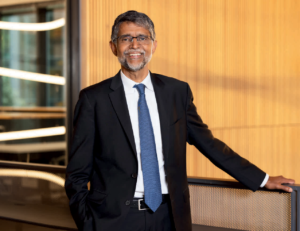 Engineering as Optimism
Engineering as Optimism
Back in May, I told the Class of 2024 that “to be an engineer is to be an optimist.” There are many challenges faced by humanity, but I remain a dedicated optimist when it comes to the ability of engineers (especially our Penn Engineers!) to meet and overcome grand challenges, including human health, climate change and the responsible implementation of artificial intelligence (AI).
These challenges also present unique opportunities to capitalize on data science and AI to drive innovation and discovery. I’m proud to share that the last year at Penn Engineering has exemplified this spirit of optimism.
This spring, Penn Engineering announced two new degree programs, the Raj and Neera Singh Program in Artificial Intelligence bachelor’s program, and the Raj and Neera Singh Program in Artificial Intelligence online master’s in AI. Both degrees are the first of their kind in the Ivy League and will prepare future engineers with a deep understanding of AI technologies and the social and ethical responsibilities they must consider.
During the September 27 dedication ceremony for Amy Gutmann Hall, our newest building and the future home of AI innovation at Penn, I shared with our alumni, friends and special guests that, “For a university, a new building is a monument, not to the past, but to the future.” Indeed, Amy Gutmann Hall is a monument to optimism, particularly that of Harlan M. Stone (C’80), the building’s lead donor, who is also a Penn Engineering parent, Advisor and University Trustee. Penn Engineering is deeply grateful to Harlan and his vision for Penn, and especially for his choice to name the building in honor of the leadership and dedication of Penn President Emerita Amy Gutmann.
Finally, on October 17, Penn Engineering launched its newest initiative, Responsible Innovation, at an event co-hosted by Perry World House and held at the Penn Washington Center. With guest speakers Michael Horowitz, the Richard Perry Professor and Director of Perry World House, and Penn Trustee and Engineering Board member Ted Schlein (C’86), the critical themes of this event included considering the long-term impacts of technological innovation, balancing innovation with regulation, and prioritizing the incorporation of ethics and social impact into engineering education.
These advancements are each made possible by the dedication of our global community of alumni and friends. To each of you, I am grateful for your steadfast commitment and continued support, and I especially look forward to what our shared sense of optimism will bring to our students, our community and the world.
Vijay Kumar, Nemirovsky Family Dean
